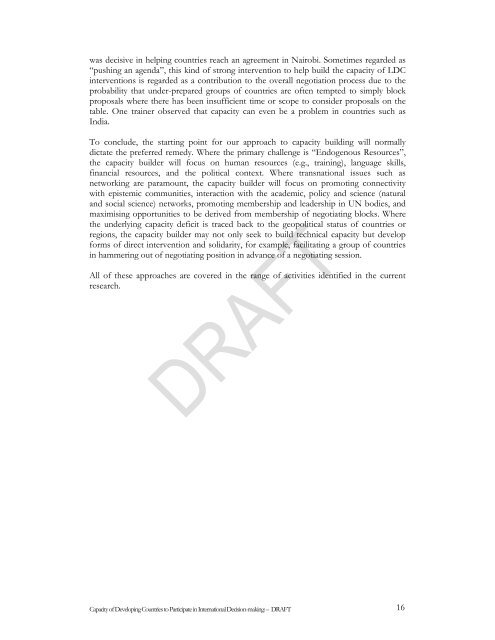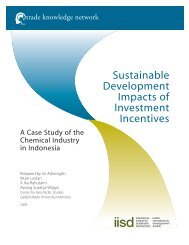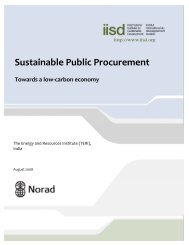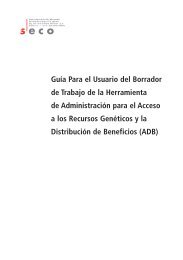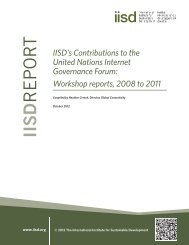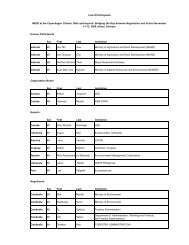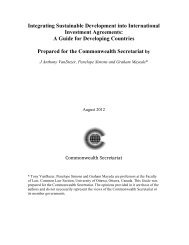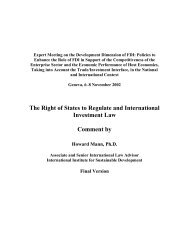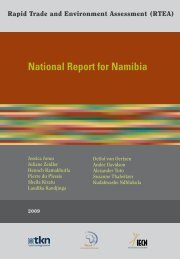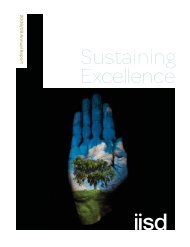Capacity of Developing Countries to Participate in International ...
Capacity of Developing Countries to Participate in International ...
Capacity of Developing Countries to Participate in International ...
Create successful ePaper yourself
Turn your PDF publications into a flip-book with our unique Google optimized e-Paper software.
was decisive <strong>in</strong> help<strong>in</strong>g countries reach an agreement <strong>in</strong> Nairobi. Sometimes regarded as<br />
“push<strong>in</strong>g an agenda”, this k<strong>in</strong>d <strong>of</strong> strong <strong>in</strong>tervention <strong>to</strong> help build the capacity <strong>of</strong> LDC<br />
<strong>in</strong>terventions is regarded as a contribution <strong>to</strong> the overall negotiation process due <strong>to</strong> the<br />
probability that under-prepared groups <strong>of</strong> countries are <strong>of</strong>ten tempted <strong>to</strong> simply block<br />
proposals where there has been <strong>in</strong>sufficient time or scope <strong>to</strong> consider proposals on the<br />
table. One tra<strong>in</strong>er observed that capacity can even be a problem <strong>in</strong> countries such as<br />
India.<br />
To conclude, the start<strong>in</strong>g po<strong>in</strong>t for our approach <strong>to</strong> capacity build<strong>in</strong>g will normally<br />
dictate the preferred remedy. Where the primary challenge is “Endogenous Resources”,<br />
the capacity builder will focus on human resources (e.g., tra<strong>in</strong><strong>in</strong>g), language skills,<br />
f<strong>in</strong>ancial resources, and the political context. Where transnational issues such as<br />
network<strong>in</strong>g are paramount, the capacity builder will focus on promot<strong>in</strong>g connectivity<br />
with epistemic communities, <strong>in</strong>teraction with the academic, policy and science (natural<br />
and social science) networks, promot<strong>in</strong>g membership and leadership <strong>in</strong> UN bodies, and<br />
maximis<strong>in</strong>g opportunities <strong>to</strong> be derived from membership <strong>of</strong> negotiat<strong>in</strong>g blocks. Where<br />
the underly<strong>in</strong>g capacity deficit is traced back <strong>to</strong> the geopolitical status <strong>of</strong> countries or<br />
regions, the capacity builder may not only seek <strong>to</strong> build technical capacity but develop<br />
forms <strong>of</strong> direct <strong>in</strong>tervention and solidarity, for example, facilitat<strong>in</strong>g a group <strong>of</strong> countries<br />
<strong>in</strong> hammer<strong>in</strong>g out <strong>of</strong> negotiat<strong>in</strong>g position <strong>in</strong> advance <strong>of</strong> a negotiat<strong>in</strong>g session.<br />
All <strong>of</strong> these approaches are covered <strong>in</strong> the range <strong>of</strong> activities identified <strong>in</strong> the current<br />
research.<br />
<strong>Capacity</strong> <strong>of</strong> <strong>Develop<strong>in</strong>g</strong> <strong>Countries</strong> <strong>to</strong> <strong>Participate</strong> <strong>in</strong> <strong>International</strong> Decision-mak<strong>in</strong>g: – DRAFT 16


